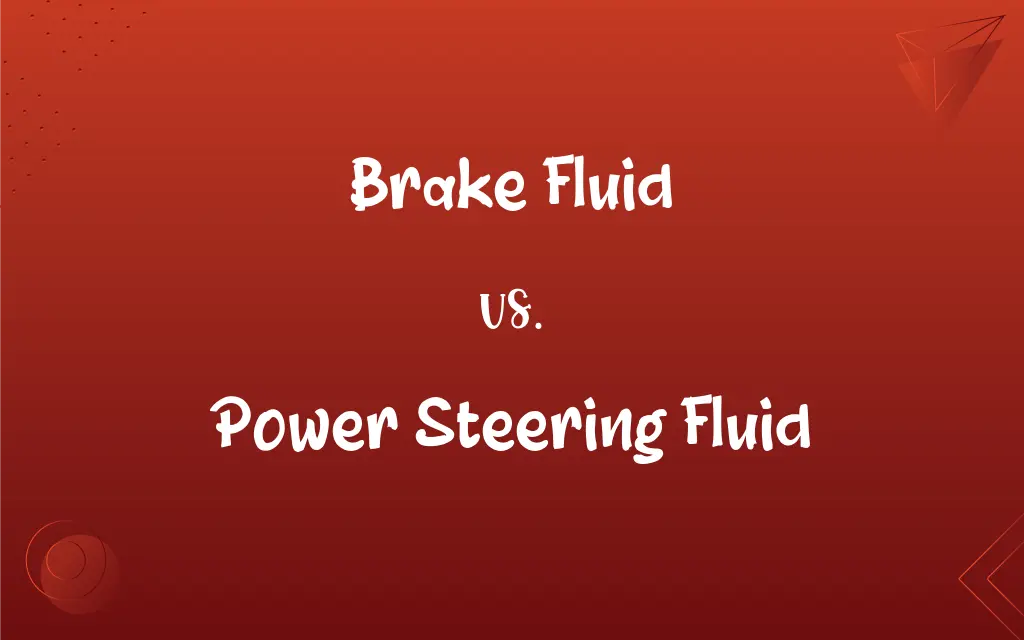Brake Fluid vs. Power Steering Fluid: What's the Difference?
Edited by Janet White || By Harlon Moss || Updated on October 13, 2023
Brake fluid is a hydraulic fluid vital for operating the brake system, whereas power steering fluid is specifically designed to help in the smooth functioning of the power steering system.

Key Differences
When discussing automobile maintenance and functionality, brake fluid and power steering fluid emerge as pivotal, yet distinct, elements. Brake fluid plays an indispensable role in ensuring that the braking system of a vehicle operates optimally, transmitting the force created by the driver onto the wheel hub. On the other hand, power steering fluid functions as a crucial component in a vehicle’s power steering system, facilitating ease of steering and enhancing the driver’s control over the vehicle.
Brake fluid possesses characteristics like high boiling points and hygroscopic properties which are instrumental in its capacity to sustain the effective functionality of the braking system even under extreme conditions. In contrast, power steering fluid, is tailored to meet the demands of assisting the power steering system, ensuring that it runs smoothly, and the vehicle responds adroitly to the driver’s inputs in steering.
To delve deeper, brake fluid is generally formulated to be compatible with rubber seals and hoses, preventing corrosion and ensuring the long-term efficacy of the brake system. Power steering fluid is similarly critical but is engineered with a different set of requirements in mind, being expected to preserve the power steering pump and to keep the steering mechanism well-lubricated and functioning seamlessly, ensuring durability and reliability in steering performance.
The necessity of regular maintenance and periodic replacement is common to both brake fluid and power steering fluid. Brake fluid, due to its hygroscopic nature, tends to absorb moisture over time, which can potentially lower its boiling point and hinder brake system performance. Similarly, power steering fluid also mandates attention, as contaminants or degradation of the fluid could jeopardize the integrity and performance of the power steering system, potentially leading to more strenuous steering or damage to the system.
Lastly, even though both brake fluid and power steering fluid are integral to vehicle operation and safety, they are not interchangeable due to the specialized functions and characteristics each possesses. Ensuring that each fluid is utilized in its respective system is paramount to maintaining the optimal performance, safety, and longevity of a vehicle, safeguarding against potential issues or failures in the brake and power steering systems.
ADVERTISEMENT
Comparison Chart
Primary Function
Transmit force within the brake system
Facilitate smooth steering
Interaction with Components
Compatible with brake system components
Lubricates and operates power steering system
Maintenance Requirements
Regular replacement due to moisture absorption
Replacement due to potential contaminants
Typical Characteristics
High boiling point, hygroscopic
Viscosity suitable for steering aid
System Impact if Failed
Braking system failure
Difficulty in steering or system damage
ADVERTISEMENT
Brake Fluid and Power Steering Fluid Definitions
Brake Fluid
Brake fluid has a high boiling point to withstand the heat generated during braking.
The high boiling point of brake fluid ensures consistent braking performance even under high-stress conditions.
Power Steering Fluid
It lubricates the power steering pump and other components, reducing wear.
Timely replenishing power steering fluid ensures smooth function and longevity of the steering system.
Brake Fluid
Regular maintenance of brake fluid is vital for optimal braking performance and safety.
Periodic brake fluid checks are imperative to ascertain its condition and ensure the braking system’s responsiveness.
Power Steering Fluid
Power steering fluid is a hydraulic medium that helps ease vehicle steering.
Without adequate power steering fluid, turning the wheel can become notably harder.
Brake Fluid
Brake fluid compatibility with system components ensures longevity and reliability of braking.
Ensuring the brake fluid is compatible with system seals avoids leaks and maintains effective braking.
Power Steering Fluid
Power steering fluid transmits the physical effort from the steering wheel to the wheels.
Proper power steering fluid levels translate the driver’s actions accurately to the car’s wheels.
Brake Fluid
Brake fluid is a hydraulic fluid used to transmit pressure within brake systems.
Brake fluid is crucial for transferring the force from the brake pedal to the brake calipers.
Power Steering Fluid
It serves to keep the power steering system operational and free from excessive wear.
Regularly checking the power steering fluid can prevent unexpected breakdowns in the steering system.
Brake Fluid
The hygroscopic nature of brake fluid allows it to absorb moisture, preventing system corrosion.
Mechanics often recommend changing brake fluid to prevent the performance degradation caused by moisture absorption.
Power Steering Fluid
Power steering fluid may have conditioners to preserve seals, preventing leaks.
High-quality power steering fluid can enhance seal durability and maintain system health.
FAQs
Is power steering fluid universal?
While there are universal fluids, it's ideal to use vehicle-specific types when possible.
What happens when brake fluid is low?
The braking system may become ineffective, and a warning light might illuminate.
Can you substitute power steering fluid for brake fluid?
No, they have distinct properties and are not interchangeable.
Can a car run without power steering fluid?
Yes, but steering will be difficult, and it could damage the steering system.
How to check power steering fluid levels?
Utilize the dipstick in the power steering reservoir, often marked with level lines.
Is it safe to drive with low brake fluid?
No, it is unsafe as it may compromise the vehicle's braking ability.
How to dispose of old power steering fluid?
Collect it and take it to a recycling center or auto shop that accepts it.
What happens if water contaminates brake fluid?
It lowers the boiling point, potentially causing brake failure.
What causes power steering fluid to overheat?
Low fluid, pump issues, or a clogged fluid line might cause overheating.
Is brake fluid corrosive?
Yes, brake fluid can be corrosive and should be handled with care.
What color is typical for brake fluid?
New brake fluid is typically clear to amber but darkens with use and age.
Can you mix different power steering fluids?
It's not recommended; always use the type specified by the vehicle manufacturer.
What impacts can contaminated power steering fluid have?
It can cause wear, damage to the steering system, and impaired steering function.
What is the main purpose of brake fluid?
To hydraulically transmit the braking force from the pedal to the brakes.
Can brake fluid be reused after bleeding brakes?
No, used brake fluid should be properly disposed of and not reused.
Why does brake fluid need to have a high boiling point?
To maintain performance under the heat generated during braking.
How often should power steering fluid be changed?
Refer to the vehicle's manual, but generally every 50,000-100,000 miles.
How often should brake fluid be changed?
Generally, every 20,000 miles or 2 years, but refer to the vehicle's manual.
Why might power steering fluid leak?
Leaks may occur from worn seals, loose connections, or system damage.
What type of brake fluid is most common?
DOT 3 and DOT 4 are commonly used in modern vehicles.
About Author
Written by
Harlon MossHarlon is a seasoned quality moderator and accomplished content writer for Difference Wiki. An alumnus of the prestigious University of California, he earned his degree in Computer Science. Leveraging his academic background, Harlon brings a meticulous and informed perspective to his work, ensuring content accuracy and excellence.
Edited by
Janet WhiteJanet White has been an esteemed writer and blogger for Difference Wiki. Holding a Master's degree in Science and Medical Journalism from the prestigious Boston University, she has consistently demonstrated her expertise and passion for her field. When she's not immersed in her work, Janet relishes her time exercising, delving into a good book, and cherishing moments with friends and family.





































































